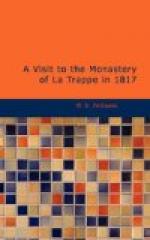on their way to different places in Bretagne, on charitable missions, by the order of the Superior at Paris. Four of these were young and beautiful women, none of whom could have attained the age of twenty; yet these females had already devoted themselves to attend on the sick and poor wherever their services might be required, for which purpose they receive a suitable education, in an Hospital at Paris, in such branches of medicine and surgery as may render them useful. They are distributed throughout the kingdom to attend the hospitals and prisons, which they do with the delicacy and attention peculiar to their sex. Of all the classes of females who thus devote themselves to a religious life, and to acts of charity, none are more respected, or more truly serviceable to their fellow-creatures. Their dress consists of a coarse brown jacket and gown, with a high linen cap, sloping down over the shoulders, and a rosary hanging round their waist.
Quitting Beauregard we crossed the river Sart: here the Province of Le Perche terminates, and we enter that of Normandy. For many miles, travelling close to the Forest of Bourse, the roads are excellent, though hilly, and the country highly cultivated in all directions. The peasantry were getting in the hay and rye harvest, and large tracts of wheat and barley were nearly ready for cutting.
The town of Alencon is the capital of L’Orne-sur-Sart. It stands in the middle of a fertile plain. The lace made here is the most valuable of any manufactured in France. The Hotel of the Prefecture is a fine building. After dinner I went to the theatre, (formerly an old manufactory), to see the Hotel Garni and Les deux Suisses: both performances were of a very moderate cast. The audience consisted principally of the military in garrison.
On the road from Alencon to Laval, we were guarded the whole day by two troopers of the Gendarmerie, who are quartered along the whole line of road from the capital; they are well armed and mounted, and keep a very vigilant guard. At every place we stopped our passports were examined. The police of this country is observed with greater rigor than at any former period of its history, with regard to passports. The circumstances under which the restoration took place, the political state of France, in regard to other powers, the conflicting interests and opinions of various parties, probably render it highly expedient. On the arrival of a stranger at Paris, his passport must be presented, and inscribed in the police book. The revision of the one under which the person has travelled is indispensably necessary. It is then carried to the British Ambassador, (if the stranger be of that nation), or to the minister of that country to which he belongs, where it must obtain the Ambassador’s signature. It is next taken to the office of the Minister of Foreign Affairs, where it is deposited until the following day, for which ten livres are charged, and afterwards to the Prefecture of the Police, to be signed there in its turn: and when all this is done no one can quit the capital for the interior without its being again signed at the Prefecture of the police.




